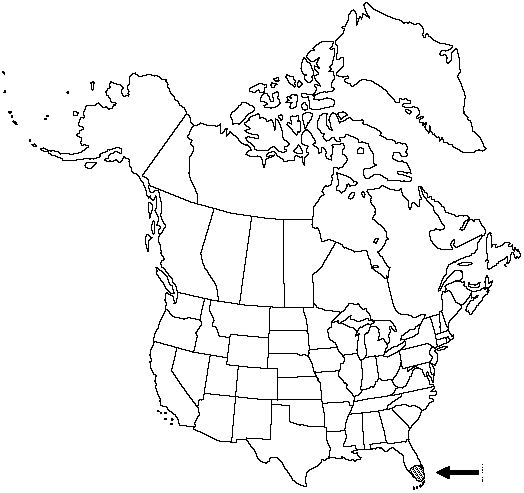Difference between revisions of "Lygodium microphyllum"
Prodr. 162. 1810.
FNA>Volume Importer |
FNA>Volume Importer |
||
| Line 20: | Line 20: | ||
}}<!-- | }}<!-- | ||
| − | --><span class="statement" id="st- | + | --><span class="statement" id="st-undefined" data-properties=""><b>Stems </b>creeping. <b>Leaves</b> to ca. 10 m. <b>Petioles</b> borne 2-5 mm apart, 7-25 cm. <b>Sterile</b> pinnae on 0.5-1.5 cm stalks, oblong, 1-pinnate, 5-12 × 3-6 cm; ultimate segments triangular-lanceolate to oblong-lanceolate, truncate to shallowly cordate or somewhat auriculate proximally, usually not lobed, but if lobed, lobes rounded at apex and not directed toward leaf apex; segment apex rounded-acute to obtuse; segments articulate to petiolules, leaving wiry stalks when detached; blade tissue glabrous abaxially. <b>Fertile</b> pinnae on 0.5-1 cm stalks, oblong, 1-pinnate, 3-14 × 2.5-6 cm; ultimate segments ovate to lanceolate-oblong, fringed with fertile lobes, otherwise similar to sterile segments.</span><!-- |
-->{{Treatment/Body | -->{{Treatment/Body | ||
| Line 43: | Line 43: | ||
|habitat=Terrestrial on riverbanks, swamps (especially cypress swamps), cabbage palm hammocks, and other wet, disturbed sites. | |habitat=Terrestrial on riverbanks, swamps (especially cypress swamps), cabbage palm hammocks, and other wet, disturbed sites. | ||
|distribution=Fla.;Asia. | |distribution=Fla.;Asia. | ||
| + | |introduced=true | ||
|reference=None | |reference=None | ||
|publication title=Prodr. | |publication title=Prodr. | ||
|publication year=1810 | |publication year=1810 | ||
|special status= | |special status= | ||
| − | |source xml=https://jpend@bitbucket.org/aafc-mbb/fna- | + | |source xml=https://jpend@bitbucket.org/aafc-mbb/fna-data-curation.git/src/9216fc802291cd3df363fd52122300479582ede7/coarse_grained_fna_xml/V2/V2_651.xml |
|genus=Lygodium | |genus=Lygodium | ||
|species=Lygodium microphyllum | |species=Lygodium microphyllum | ||
| − | |||
| − | |||
| − | |||
| − | |||
| − | |||
| − | |||
| − | |||
| − | |||
| − | |||
| − | |||
| − | |||
| − | |||
| − | |||
| − | |||
| − | |||
| − | |||
| − | |||
| − | |||
}}<!-- | }}<!-- | ||
-->[[Category:Treatment]][[Category:Lygodium]] | -->[[Category:Treatment]][[Category:Lygodium]] | ||
Revision as of 13:25, 27 July 2019
Stems creeping. Leaves to ca. 10 m. Petioles borne 2-5 mm apart, 7-25 cm. Sterile pinnae on 0.5-1.5 cm stalks, oblong, 1-pinnate, 5-12 × 3-6 cm; ultimate segments triangular-lanceolate to oblong-lanceolate, truncate to shallowly cordate or somewhat auriculate proximally, usually not lobed, but if lobed, lobes rounded at apex and not directed toward leaf apex; segment apex rounded-acute to obtuse; segments articulate to petiolules, leaving wiry stalks when detached; blade tissue glabrous abaxially. Fertile pinnae on 0.5-1 cm stalks, oblong, 1-pinnate, 3-14 × 2.5-6 cm; ultimate segments ovate to lanceolate-oblong, fringed with fertile lobes, otherwise similar to sterile segments.
Habitat: Terrestrial on riverbanks, swamps (especially cypress swamps), cabbage palm hammocks, and other wet, disturbed sites.
Discussion
Lygodium microphyllum is native to southeastern Asia and recently naturalized. The species may be very abundant locally and may climb to a height of 9 meters in trees. Sometimes it forms thick mats covering considerable areas at ground level (J. Beckner 1968; C. E. Nauman and D. F. Austin 1978).
Selected References
None.
